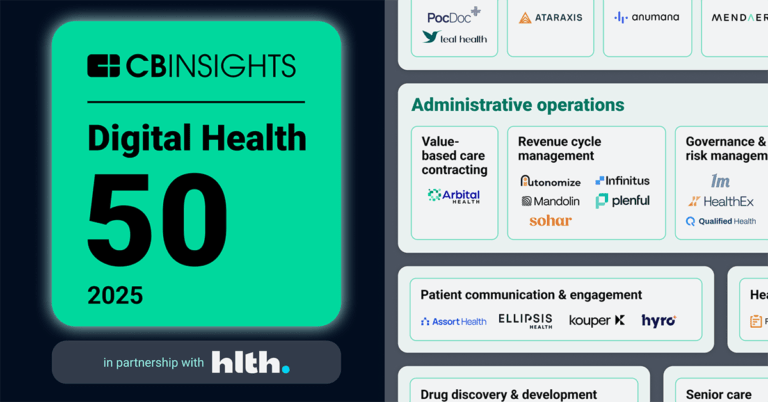
Carta Healthcare
Founded Year
2017Stage
Series B - III | AliveTotal Raised
$60.55MLast Raised
$18.25M | 6 mos agoMosaic Score The Mosaic Score is an algorithm that measures the overall financial health and market potential of private companies.
+82 points in the past 30 days
About Carta Healthcare
Carta Healthcare focuses on addressing healthcare data challenges within the healthcare industry. It offers AI technology and expertise to support workflows, allowing hospitals to use their data for patient care, quality, operational, and research purposes. The company primarily serves the healthcare sector, and their solutions are designed to assist healthcare professionals in their roles. It was founded in 2017 and is based in San Francisco, California.
Loading...
ESPs containing Carta Healthcare
The ESP matrix leverages data and analyst insight to identify and rank leading companies in a given technology landscape.
The patient data aggregation market addresses the need for sharing patient information at scale, in various formats and ways, while reducing the number of point-to-point integrations/interfaces. These platforms allow healthcare providers to access and analyze patient data from multiple sources, improving the accuracy and completeness of patient records. The market is driven by the increasing deman…
Carta Healthcare named as Challenger among 12 other companies, including Health Gorilla, Redox, and Rhapsody.
Carta Healthcare's Products & Differentiators
Atlas
Using AI, our Atlas software abstracts data from medical records to automatically populate clinical registry fields. Registry participation is essential for quality initiatives and patient care, but often involves time-consuming, manual labor and redirects resources away from patient care. Atlas unifies an HCO’s data, accessing it from multiple electronic health records (EHR) systems and other data sources, extracts data from structured fields (e.g., ICD-10 codes, standardized demographic data), Uses natural language processing (NLP) to “read” through unstructured data such as clinical notes, lab reports, and more. Standardizes all data into a single usable FHIR-based format for use across multiple systems and reporting tools. Transforms clinical notes into an easy-to-search format. Assists with registry submission
Loading...
Research containing Carta Healthcare
Get data-driven expert analysis from the CB Insights Intelligence Unit.
CB Insights Intelligence Analysts have mentioned Carta Healthcare in 1 CB Insights research brief, most recently on Oct 20, 2025.

Oct 20, 2025 report
Digital Health 50: The most promising digital health startups of 2025Expert Collections containing Carta Healthcare
Expert Collections are analyst-curated lists that highlight the companies you need to know in the most important technology spaces.
Carta Healthcare is included in 3 Expert Collections, including Digital Health.
Digital Health
12,122 items
The digital health collection includes vendors developing software, platforms, sensor & robotic hardware, health data infrastructure, and tech-enabled services in healthcare. The list excludes pureplay pharma/biopharma, sequencing instruments, gene editing, and assistive tech.
Artificial Intelligence (AI)
20,629 items
Digital Health 50
50 items
Latest Carta Healthcare News
Nov 6, 2025
Andrew Crowder, Vice President of Engineering at Carta Healthcare Generative AI is no longer a novelty, it’s a necessity. For healthcare leaders, the conversation has evolved beyond proof of concept. The real challenge now is integration: embedding these models into clinical workflows in ways that are safe, scalable, and operationally sound. Success demands more than impressive outputs. It requires systems built for healthcare’s complexity, with the agility to support frontline decisions and the clarity to preserve the human judgment at the heart of care. For most people, AI begins and ends with chat. Whether it’s ChatGPT or a hospital support bot, the pattern is familiar: ask a question, get an answer. It’s intuitive, but it’s not enough for healthcare. Clinical environments are flooded with complex, high-stakes data, much of it unstructured and constantly evolving. One-off prompts can’t keep up. What healthcare needs is agentic AI : systems that don’t just respond, but proactively observe, synthesize, and act. These models operate quietly in the background, parsing records, surfacing insights, and resolving nuanced clinical questions, without waiting to be asked. That’s the shift from interaction to intelligence. Context is King: Why Information Flow Shapes Model Performance Even the most advanced AI models need guidance, and that guidance comes from context. In healthcare, context is anything but simple. It’s not just what data you provide, but how, when, and in what form. Clinical systems generate vast volumes of information: vitals, free-text notes, repeated entries, and layers of noise. The answer to a critical question might be buried somewhere in that mix, but without clear direction, the model won’t find it. To deliver meaningful results, AI must be engineered to navigate complexity, knowing not just what to analyze, but where to look and why it matters. The real challenge is knowing what information to send to the model and when. A single medical record often contains more data than a model can process at once, and most of it won’t be relevant to the question at hand. What matters for one task might be meaningless, or even misleading, for another. Therefore, good performance requires an understanding of clinical intent. A patient note might look like a list of facts, but it’s also a narrative. If you don’t capture the right part of that narrative, the response might be technically correct, but clinically useless. True Intelligence is the Ability to Use Tools There was a time when building AI meant writing out rules: if this, then that. Then we moved to training models to find patterns. Now, the next step is giving those models tools and letting them decide how to use them. For example, a model might need to retrieve structured medication data from a database or scan a PDF discharge summary before answering a clinical question. Each of these tools, retrieving, parsing, cross-referencing, helps the model go beyond language and solve more complex problems with greater accuracy. This shift changes the role of a model entirely. Instead of just answering questions, the model can reason about how to answer them. For example, we could feed the model a clinical note and ask whether a patient received a certain medication. The model might read the note and conclude that it lacks enough information. Rather than guessing, it can now go look: query a medication log, check a database, or cross-reference lab results. The key is that it decides. This orchestration is especially important in clinical data abstraction workflows, where responses often depend on multiple sources and subtle context. You need components that can parse documents, fetch data, validate outputs, and move information between steps. A tool-using model is more adaptable. Rigid systems can break under variability. Tool-using systems can flex, retrieve what they need, and return results that are more accurate and durable across use cases. Writing Love Letters to AI: The Art and Science of Prompt Tuning The way a question is phrased impacts how accurately the model responds. Getting it right is less about writing style and more about engineering – testing, refining, and adjusting language to find what works in each scenario. Think of it like writing a love letter, they are personal. Your structure, tone, and even length depend on who you are, what you want to convey, and who’s on the receiving end. Prompt design works the same way. You’re crafting language not only to share information, but to guide behavior. Some tasks require logic; others call for interpretation. As models evolve, the same prompt might perform differently across updates, requiring ongoing tuning and maintenance. Producing consistent results means understanding how language drives behavior in systems built to mimic how we think. Lessons from Scaling AI Integration Scaling any generative AI model brings new challenges. Throughput, latency, and cost are all obvious. In healthcare, the bigger concern is trust. When a model returns a response, clinicians want to know where it came from, whether it’s accurate, and how confident the system is. Studies suggest that trust increases when outputs are explainable, when models are transparent about uncertainty, and when systems are tailored to local data and workflows. Without that trust, even the most accurate models can struggle to gain traction in real-world care. The safest clinical-grade systems have guardrails: workflows that link model outputs to evidence, citations, and an audit trail. This is Hybrid Intelligence : a deliberate division of labor between machine and expert. The model is the engine, and it moves fast. But the human is still holding the wheel, making sure it’s pointed in the right direction. Shaping the Future of Applied Intelligence Intelligence doesn’t come from the model alone. It comes from the system around it: the tools, workflows, people, and decisions that guide how and when the model is used. Deploying AI in healthcare isn’t just a technical challenge, it’s a real-world imperative. Success demands systems that can extract, structure, and validate data at scale, while embedding safeguards that keep clinicians in control. But technology alone isn’t enough. What’s needed are solutions that understand the full spectrum of clinical, technical, and operational complexity, and fit for the demands of everyday patient care. About Andrew Crowder Andrew Crowder leads the engineering team at Carta Healthcare . Andrew is a results-oriented software engineering executive and AI innovation leader. Andrew drives the integration of cutting-edge AI into impactful healthcare solutions. His focus on “Applied AI” delivers tangible efficiency gains in medical data analysis. He champions the transformative power of thoughtful technology in healthcare, always prioritizing the user experience and workflow improvement.
Carta Healthcare Frequently Asked Questions (FAQ)
When was Carta Healthcare founded?
Carta Healthcare was founded in 2017.
Where is Carta Healthcare's headquarters?
Carta Healthcare's headquarters is located at 2443 Filimore Street, San Francisco.
What is Carta Healthcare's latest funding round?
Carta Healthcare's latest funding round is Series B - III.
How much did Carta Healthcare raise?
Carta Healthcare raised a total of $60.55M.
Who are the investors of Carta Healthcare?
Investors of Carta Healthcare include Storm Ventures, Frist Cressey Ventures, Paramark Ventures, CU Healthcare Innovation Fund, Memorial Hermann and 25 more.
Who are Carta Healthcare's competitors?
Competitors of Carta Healthcare include Q-Centrix and 7 more.
What products does Carta Healthcare offer?
Carta Healthcare's products include Atlas and 2 more.
Loading...
Compare Carta Healthcare to Competitors

Datavant operates as a data platform company for healthcare, focusing on data connectivity and interoperability within the healthcare sector. The company offers services that include health data exchange, record retrieval, data transformation, and revenue cycle management, aimed at facilitating secure and efficient data movement and connection. Datavant primarily serves health plans, healthcare providers, life sciences companies, and legal and insurance sectors, providing them with tools related to data. It was founded in 2017 and is based in Phoenix, Arizona.

Innovaccer operates within the healthcare sector, providing a healthcare intelligence cloud to integrate and analyze healthcare data. This supports value-based care and population health management. Innovaccer serves a diverse range of entities within the healthcare industry, including healthcare providers, payers, public sector entities, and life sciences organizations. It was founded in 2014 and is based in San Francisco, California.

eClinicalWorks focuses on electronic health records (EHR) and practice management. The company provides products including telehealth services, population health management, patient engagement, and revenue cycle management. eClinicalWorks serves the healthcare sector, providing solutions for various medical specialties. It was founded in 1999 and is based in Westborough, Massachusetts.

Abacus Insights focuses on healthcare data management, providing a platform that consolidates and normalizes data to present patient records. The company serves the healthcare payer industry and offers solutions for risk adjustment, interoperability, clinical data exchange, and compliance reporting. It was founded in 2017 and is based in Boston, Massachusetts.

Clinithink is a technology company specializing in artificial intelligence for the life sciences and healthcare sectors. The company offers AI solutions that analyze unstructured healthcare data. Clinithink serves the pharmaceutical and healthcare industries with its AI technology aimed at enhancing clinical trial processes, disease diagnosis, and revenue management. It was founded in 2009 and is based in Bridgend, United Kingdom.

Komodo Health focuses on providing data-driven insights in the healthcare sector. The company offers a software platform that analyzes a variety of data to provide insights for various healthcare stakeholders. These insights aim to assist life sciences, patient advocacy, healthcare practitioners, and payers in their efforts to support patient care and manage costs. It was founded in 2014 and is based in New York, New York.
Loading...
